Uniarts GINTL
The UniArts GINTL collaboration sets out to expand our understanding on knowledge and knowing through artistic thinking and art making. With the help of concrete arts-based practices, the project aims to diversify pedagogical processes. The international project develops an open, global platform for wide-ranging dialogues related to learning and education.
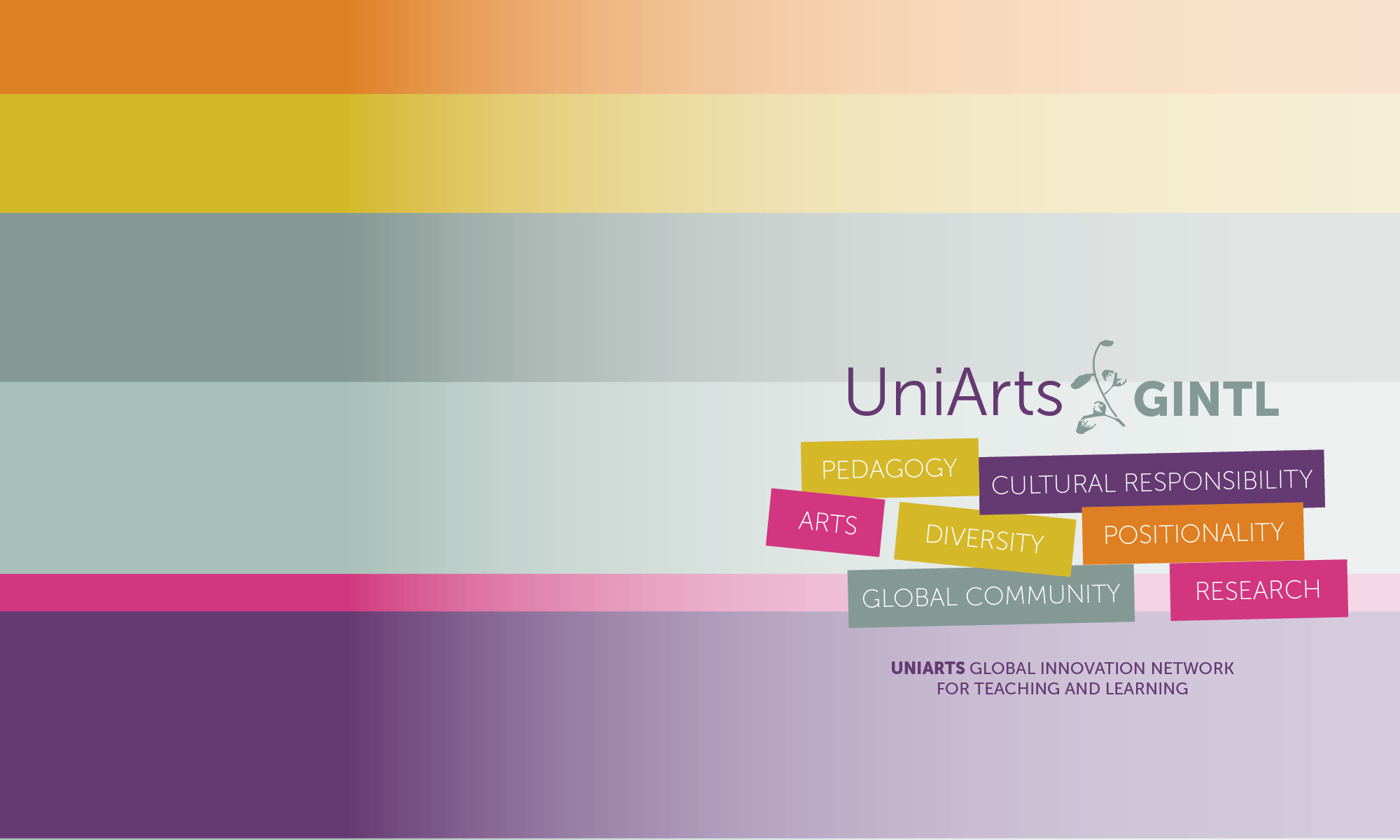
Introduction
UniArts GINTL is a research-based project that develops international educational partnerships through artistic thinking and art practice. In the UniArts GINTL project, artists, teachers, and researchers commence, develop, and maintain responsible joint endeavours. At the heart of the arts-based approach is coming together in dialogue.
Arts pedagogy that builds sustainable futures both requires and constructs knowledge on intercultural collaboration. Arts-based and experiential processes make room for stopping and sharing. This allows for topical and historical phenomena affecting education, such as distribution of power and ethical and ecological challenges, to be examined. The project centres on reciprocal and collective possibilities of knowledge formation.
Seminars
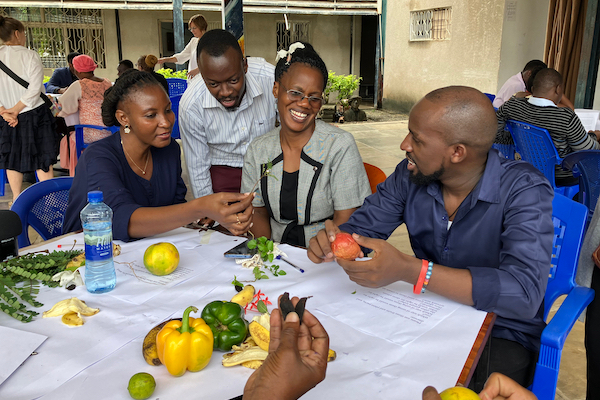
Seminar on university pedagogy in the arts at the University of Dar es Salaam
On 6th November 2023, a seminar day on higher arts education was held at the University of Dar es Salaam. The event was organised together with the Department of Creative Arts of the University of Dar es Salaam, and UniArts GINTL. Despite the shorter and lighter of Tanzania’s rainy seasons serving heavier than expected rainfall, the day brought together a large number of academic staff from the department.
Originally established as a unit for teaching theatre arts, the Department of Creative Arts now offers degrees in music, theatre, film and TV, as well as fine arts and design, ranging from the bachelor’s to the doctoral level. In addition, working artists’ residencies are held at the campus.
During the planning for the seminar day, a shared interest in developing the pedagogical thinking and skills of artist-teachers had emerged. A key question was, how the artist’s own artistic practice and the knowledge generated from those processes were transformed and supportive towards the pedagogical work. The head of the Department of Creative Arts, art teacher and researcher Dr. Daines Sanga, also hoped the seminar would touch upon the numerous opportunities offered by the arts in supporting pedagogies other than the “banking model” of education.
Indeed, there was time to discuss many other possibilities in higher arts education. At the beginning of the seminar day, the practices of the Department of Creative Arts and the expectations towards the upcoming academic year were discussed. From here, we moved on to exploring different pedagogical approaches, ranging from learning café -type discussions to examples of studio discussions and artistic research practices.
UniArts GINTL artists and teachers Dr. Marika Orenius, Prof. Tarja Pitkänen-Walter and Kenneth Siren gave a short presentation about the University of the Arts Helsinki and what its university pedagogical studies in the arts have to offer. From there, as a counterbalance to all the sitting, we moved on to experimenting with an artistic research practice used by Siren in their thesis work, in which repeating still body positions lead to associating freely. This, like the other suggestions or invitations to art pedagogy presented at the seminar, aimed at taking into account the existing knowledge being brought in by the participants.
As the afternoon rain was pelting down, Prof. Pitkänen-Walter and Dr. Orenius gave a demonstration on studio discussions, a widely used method at the Academy of Fine Arts of the University of the Arts Helsinki. Studio discussion describes a situation where the learner and the teacher meet in the presence of a work of art that is being made. In this situation, the aim is to create a reciprocal, shared space of in-between, in which the unfinished work steers the discussion and enables the grasping of the knowledge that is not yet known. Dr. Dinnah Enock, a researcher and sculptor at the University of Dar es Salaam, stepped into the role of an artist presenting her work. The audience participated in the discussion in the presence of the works, and afterwards the studio discussion was reflected on as a teaching method.
For the last session of the day, some tables were set up similarly to a learning café. This demonstration showcased how the university pedagogical studies in the arts the at the Uniarts Helsinki combine theoretical discourses, artistic practices, and open discussion. Ethical questions related to teaching in the arts were approached in different ways: For example, the participants drew self-portraits with their eyes closed, based on their sense of touch, and then used their experiences to locate values. Notes about a theory of situational ethics were written for the following participants to discover. Whereas, in the university pedagogical studies in the arts in Helsinki, the arts teacher’s microethical activities had been approached with butternut squash seedling, now local plant parts and fruits took part in the practice.
What became strongly highlighted, was the importance of the teacher’s own artistic work as part of the pedagogical practice at the university. It was agreed that the arts tackle themes and societal phenomena on a sensory and emotional level. Starting from practical activities and continuing in a more abstract direction was regarded as sensible. Whereas the banking model of education assumes that the teacher brings with them the already known facts, art pedagogy can follow a different kind of logic: the artistic process can begin without clear knowledge about the outcome, and so teaching can also find its shape during the learning process together with the learners.
Documentarist Aika Kirei filmed footage at the event as material that can be returned to later. Here’s a YouTube link to video documentation on the seminar day.
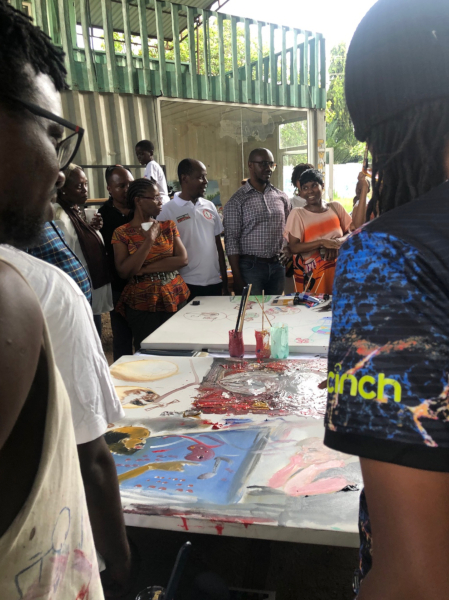
Seminar day on artistic thinking and practice
In November 2023, the UniArts GINTL team visited Nafasi Art Space, in Dar es Salaam, for the second time. The seminar day delved into the connections between knowledge formation and artistic thinking and practice. The event was visited by both already-established collaborators as well as new acquaintances.
The event, held on 3rd November, was organized together with Alama Art and Media Production. At the suggestion of Alama’s artistic director Paul Ndunguru, two large-scale paintings were created at the event, which were then joined together into a single work.
The artist-teachers from the UniArts GINTL team, Marika Orenius, Tarja Pitkänen-Walter, and Kenneth Siren devised discussion groups around the collaborative painting. The groups engaged with questions revolving around art and pedagogy in the arts. How do artistic thinking and practice help us understand different phenomena? What role does arts pedagogy play in this?
The temporal perspective of learning in the arts was approached with questions such as: Which artworks and people have influenced you on your journey to work in the arts? How do viewers and different environments interact with your works? What kind of arts pedagogy does the future need, and what kind of futures could the arts create?
Among other insights, the responses found links between ideas, feelings, and creativity. Artistic ideas sometimes require an external stimulus, and sometimes some peaceful alone time. Becoming an artist could come through rising up to challenges or from being granted individual freedom. Some participants also saw artistry as something inherited in the blood and from the family heritage. Overall, many hoped that taking part in the arts could become more accessible across diverse communities and different educational backgrounds. Online environments and smart technology were recognised to enable practicing the arts even in remote areas and over long geographical distances.
The participants of the day represented a wide range of artistic disciplines. Among the many, creating writing, dance, film, fine arts, music, and theatre were represented. From their discussions, the participants chose topics to bring to the painting. These topics were then expressed in the painting through both representational and abstract forms. At Orenius’s suggestion, a camera harness was devised to be worn on the participant’s chest. This allowed the artists to film their painting process in a self-directed, close-up manner. A small crew led by documentarist Aika Kirei filmed material at the event for later use. Here’s a YouTube link to video documentation on the workshop.
The seminar day ended with a performance by The Zawose Family, a music and dance group from Bagamoyo. The group follows in the footsteps of late musician Hukwe Zawose. Highly regarded for his singing, and expertise with ilimba and zeze, Dr. Zawose was awarded an honorary doctorate from the Sibelius Academy in 1997.
Coincidentally during the seminar day, Nafasi also hosted a large event for schoolchildren. Towards the end of the day, a group of children joined to follow the dance performance and finished the collaborative painting.
“Sanaa ni udongo na chipukizi” — “Art is both the earth and the sprout”
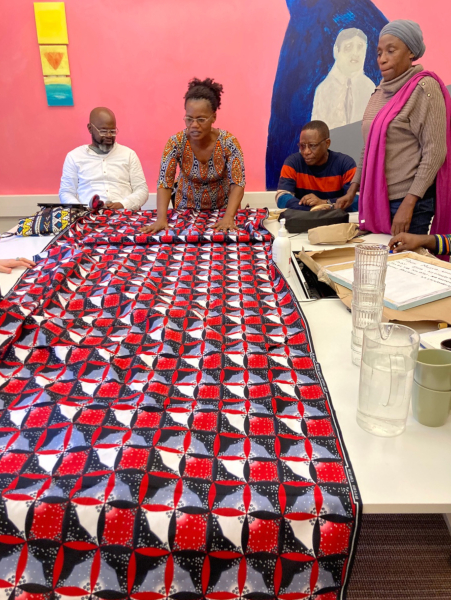
Conventions of higher education in the arts, and the informally trained arts teacher
During the visit organised by the UniArts GINTL project, a seminar day was held on the historic maritime fortress island of Suomenlinna just off the Helsinki coast. In the seminar, the guests representing four Tanzanian arts institutions, and the Finnish teacher-researchers of the project discussed both arts pedagogy at the higher education level and the status of the so-called self-taught teacher in the arts. What happens when the self-taught artist becomes a teacher? What kind of pedagogy will they construct out of their own relationship with the arts and their past experiences?
Many of the guests expressed interest in curriculum development in higher education pedagogy in the arts. In Suomenlinna, teachers from Uniarts Helsinki’s University Pedagogical Studies in the Arts held a presentation on the structure of the studies, and the contents of and values underlining the curriculum. Experiences and findings from the Non-Degree Pedagogical Studies in the Arts were touched upon as well. In the studies, broad topics such as acting ethically, advancing sustainability, acknowledging diversity, and examining questions of power, are brought together with the actual teaching practices in the arts.
During the day, 19th of April 2023, the participants split into smaller groups to reflect on the status and the diverse skillsets of the so-called self-taught teacher. From the outset, it was decided that, at least in the Tanzanian context, the term “self-taught” came across inaccurately. In fact, the artist would have drawn their craft from somewhere, from their past experiences, as part of a community or communities. Therefore, the term “informally trained” was preferred.
The status of the informally trained artist must be strengthened in the higher education system. During the talks, certain ideas about the informally trained artist-turned-teacher were put forward: Perhaps the artist has been drawing from their experiences with and observations of their community’s customs and traditions; hence, they can support the continuation of local or indigenous artistic expressions. The artist-teacher who has had an informal training might not be inclined to follow rigid procedural systems for measuring learning and growth but be willing to take into account the actual pedagogical situations as well as apply their skills in varying informal environments.
The challenge identified in both Finland and Tanzania was the recognition of informal learning in higher education systems. However, formal education in pedagogy in the arts was considered potentially useful for the informally trained artist. Since they may have based their artistry and teaching on a very particular and personal point of view, formal education may provide diverse, alternative ways to teach. Formal training should offer the time and the means for the artist-teacher to reflect how they themselves were taught and how they learned succesfully, and whether alternative ways could be found to complement these.
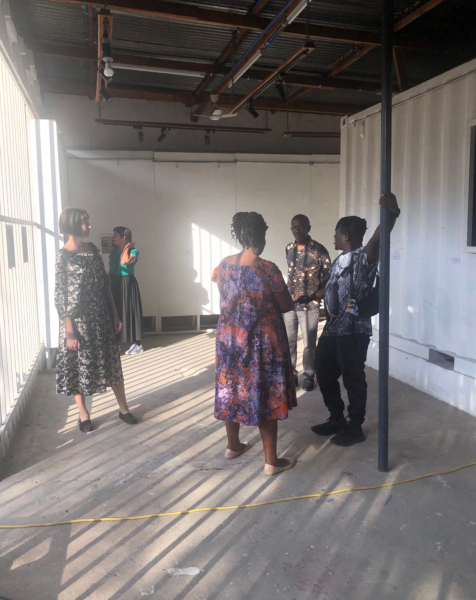
Seminar day at Nafasi Art Space
On October 24, 2022, UniArts GINTL organized a seminar in collaboration with Nafasi Art Space. At the event, artists and arts educators came together to discuss ongoing and relevant questions, such as the expectations of the art field and the aspirations of artists for the future. How could the role of art and art pedagogy bestrengthened in society? What kinds of learning and teaching methods could multidisciplinary and international collaboration co-create?
Nafasi Art Space is an arts organization founded in 2008 in Dar es Salaam. Nafasi provides gallery, performance, and workspace facilities. As a cultural institution, it aims to nurture creativity and professionalism within the Tanzanian art scene while organizing accessible art events for all audiences. In addition to short-term training and collegial activities, the quite recently established Nafasi Academy offers long-term arts education and mentoring to young artists from various disciplines.
Approximately 50 local artists, artist-educators, and representatives from art institutions participated in the seminar. Jaana Erkkilä-Hill, Vice Rector responsible for research at the University of the Arts Helsinki sent hergreetings to the event via video call. As the evening progressed into round-table discussions in the style of the learning café, the attendees pondered on the knowledge generated by art, and on the questions related to art pedagogy.
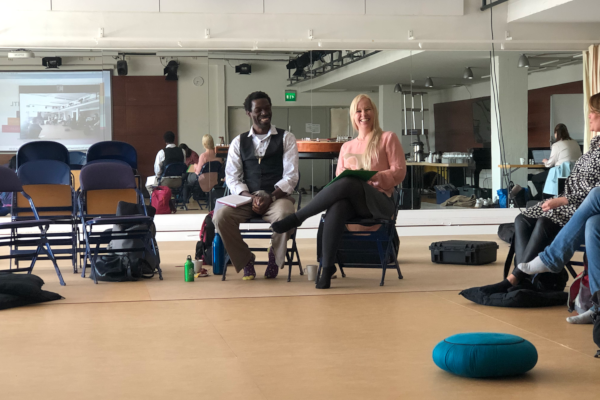
Seminar on decolonised knowledges, and the beauty of ngoma
In May 2022, UniArts GINTL organised the seminar Co-Creating Decolonized Knowledges Through Arts at the Theatre Academy of the Uniarts Helsinki. The list of presenters, facilitators, and panelists at the event included, among others, the head of university pedagogical studies in the arts Heli Kauppila, lecturer in art pedagogy Marika Orenius, lecturer and researcher in music education Katja Thomson, docent in sociology with specific expertise in studies in diversity Alemanji Aminkeng Atabong (UniArts GINTL 2022), multi-instrumentalist and educator Kauzeni Lyamba, musician and visiting teacher at the Sibelius Academy Kasheshi Makena, and choreographer and dance teacher Heidi Seppälä. The afternoon was set off artfully by the band Venhe.
Decolonial practices and decolonising knowledge were approached through lectures, participatory sessions, and sharing. Many in the audience seemed drawn to the concept “ngoma”. Standing for a dance, a drumming instrument, a celebration as well as any and all art forms present at the same time, ngoma was considered an inviting tool to resist the splitting of the arts into specific, separate disciplines which has taken root in the Western arts education.
Check the site for the seminar.
Visits
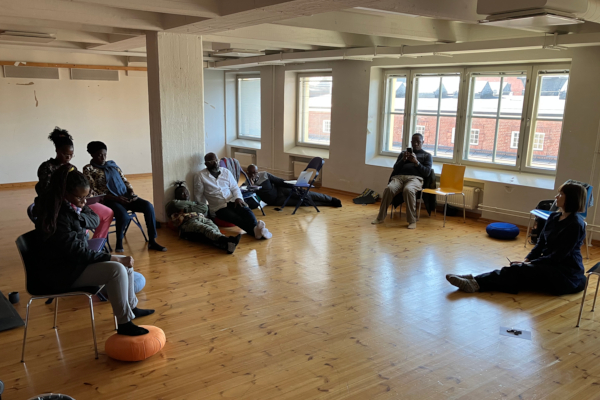
Building international partnerships
In October 2022, representatives from the Uniarts Helsinki visited Dar es Salaam, Tanzania. University lecturer Heli Kauppila, lecturer Marika Orenius, and other active members of the project met with artists and educators from the University of Dar es Salaam Creative Arts, Bagamoyo College of Arts, the Action Music Academy Tanzania, Alama Art and Media Production, and Nafasi Art Space, amongst others.
Reciprocal visit to Uniarts Helsinki by Tanzanian partners
Between the 17th and 21st of April 2023, the University of the Arts Helsinki had the pleasure of hosting a group of artists, researchers, and teachers in the arts from Bagamoyo and Dar es Salaam, Tanzania. The artist-teachers represented several institutions in arts education, such as University of Dar es Salaam, Creative Arts; TaSUBa (Bagamoyo Institute of Arts); Action Music Academy Tanzania; Alama Art and Media Production, and Nafasi Art Space. The trip included visits to the different academies that make up Uniarts Helsinki, and presentations about the work of the Tanzanian institutions. Local Finnish cultural sites and organisations were visited as well.
The guests represented different disciplines of the arts, and many combined practices of the different fields in their work. Therefore, getting to know the different academies of Uniarts Helsinki felt very appropriate. The Sibelius Academy welcomed the guests with open practice sessions by the Music Education, and the Global Music programmes. One of the visiting artists, Kauzeni Lyamba, a multi-instrumentalist and performer, held an open workshop at the Musiikkitalo concert building.
At the Academy of Fine Arts, we took a look at the setting up of Kuvan Kevät. The annual MFA degree exhibition showcases works by students who are finishing their studies. Additionally, we got to briefly observe the work that goes into research on pigments. The Theare Academy enabled meeting academic and administrative staff and trying out some specific performative practices in artistic research. During the week, many different topics were touched upon in conversation, from opportunities for international students to the sculpting materials local to both countries respectively.
Even though the April weather was not necessarily sunny or warm, Uniarts and Helsinki were described as friendly and welcoming. The eight-day trip was organised as part of the UniArts GINTL project to build partnerships in the arts education. The collaboration will continue in the form of return visits and remote meetings.
Visits to the Department of Creative Arts, University of Dar es Salaam
Two autumns in a row, the team from the UniArts GINTL project has visited the Department of Creative Arts of the University of Dar es Salaam. In 2022, the team was introduced to the teaching activities and facilities of the university as well as its exhibition spaces. The visit laid the groundwork for future cooperation. During the November 2023 visit, an arts-based university pedagogical seminar day was created collaboratively. The UniArts GINTL team also got to know the residence artist programme of the UDSM Creative Arts, which at the time focused of sustainability and found materials. As the collaboration was deepened, knowledge on different possibilities and practices for teaching in the arts was exchanged.
Daines Sanga’s guest talk at the university pedagogical studies in the arts
At the 15th November 2023 meeting of the university pedagogical studies in the arts, of the University of the Arts Helsinki, Dr. Daines Sanga gave a guest lecture remotely. Dr. Sanga is the Head of the Department of Creative Arts of the University of Dar es Salaam. During the session, Dr. Sanga talked about the diversity of working methods and the diversity of students and staff at the Department of Creative Arts. The department offers studies in visual arts, design, theatre, film and music.
Dr. Sanga, who has written about community arts, youth cultures, and gender in the arts, talked about her own journey as a student, teacher, and artist researcher. Among other topics, she offered insights into how gender, geographical area, and birth order may affect opportunities to study.
The teachers of the study unit “Diversity in arts education”, Dr. Anu Koskinen and Kenneth Siren, facilitated the session. The discussion brought up interesting similarities and distinctions between the two institutions. For example, the admissions to the Department of Creative Arts of the University of Dar es Salaam are largely determined through a national system whereas entrance examinations have been central at the University of the Arts Helsinki. Sanga, who defended her doctoral dissertation at the University of Bayreuth, also highlighted the differences between German and Tanzanian educational cultures.
The collaboration between the Department of Creative Arts of the University of Dar es Salaam and the University of the Arts Helsinki was made possible through the educational partnership initiated during the UniArts GINTL project.
Visiting the Cultural Arts Centre Zanzibar
At the end of October and beginning of November 2023, the UniArts GINTL team visited Tanzania to continue the discussion on art pedagogy and international collaboration. During the trip, the team deepened contacts with previously found partners and met with new potential collaborators.
One of the new connections made was with the Cultural Arts Centre Zanzibar, which the team visited on 30th October. Founded in 2006 by painter Hamad Hamad, the cultural centre is located in the Stone Town of Zanzibar. In addition to providing working space for artists, the centre offers a wide range of courses from painting and screen printing to soap making and bookbinding. In particular, the centre organises arts classes and workshops for local women and students.
Other branches of the project
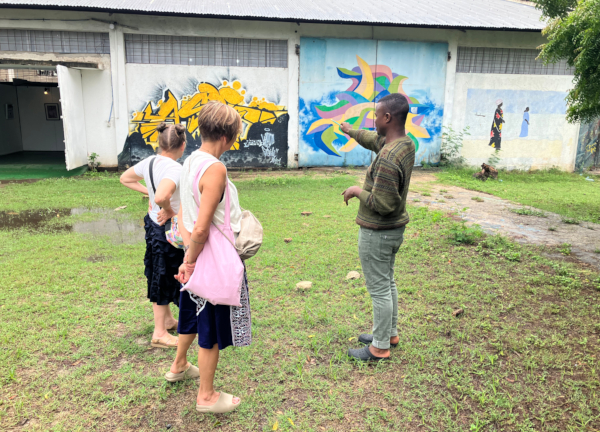
Developing an arts-based library at Nafasi
Nafasi Art Space has been developing a reading library for artists in Dar es Salaam. In the spring of 2024, UniArts GINTL project sent ten books to their collection, selected from Uniarts Helsinki’s publications on fine arts, curating, performing arts, and arts pedagogy.
The Nafasi Academy of the Nafasi Art Space offers two-year learning programmes for artists and curators. The establishment and development of an arts reference library is part of Nafasi’s strategy for artist development.
Advancing antiracism and decolonising university in higher education pedagogy in the arts
The UniArts GINTL project and the University Pedagogical Studies in the Arts collaborated on the development of a new study unit which was held in the autumn 2022. The objective was to introduce decoloniality as a theme to the university researchers and teachers, with connected theoretical underpinnings and examples from the practice .
Arts pedagogy making space for idleness and stopping
Collaboration striving towards equality needs to be grounded in an ongoing dialogue. Therefore, it was decided that the project would not be founded on advancing any particular predetermined educational content. Rather, the project would make space for stopping and observing those phenomena, topical or arising from tradition, which affect education and art making.
At the ELIA Biennial Conference, held at the Theatre Academy of Uniarts Helsinki in November 2022, Heli Kauppila, Marika Orenius, and Katja Thomson held a participatory session where topical questions and the spaces for teaching were approached through idleness and arts-based reflection. The journey took the participants from underneath the skylights of the Mylly building to the warmly and dimly lit studios of Kookos where written instructions facilitated stopping, slow pondering, and soft movement.
Read more about the ELIA 2022: No Stone Unturned conference. An “aftermovie” of the conference can be found through the link.
Developing education with artistic thinking and arts-pedagogical competence
The study module pilot made possible by the UniArts GINTL project was presented at the Pedaforum: Higher Education Pedagogy seminar held at Tampere on June 7, 2023. Heli Kauppila introduced the multifaceted connections between teaching and research in a conference presentation which was based on her own experiences as the head of the UniArts GINTL project and university pedagogy in the arts program. In her presentation, Heli reflected on a sustainable and diverse university community from the perspectives of a sense of belonging, sufficiency, and supportive orientation.
During the conference, a topic that aroused interest was linking developing pedagogy with artistic thinking and arts-pedagogical competence. Higher education pedagogical studies were seen as an opportunity to foster reciprocity and collaboration between students, teachers, and researchers.
Exchanging experiences with the University of Lapland and the Uniarts Helsinki
The “Arts, Culture and Well-being” group of the University of Lapland’s Safinet network invited Heli Kauppila and Marika Orenius to their online meeting on May 24, 2023. During the remote visit, participants shared experiences from various educational partnerships and the processes of building cooperation between Finnish, Namibian, and Tanzanian universities, teachers, and researchers. Heli and Marika talked about the phases of the UniArts GINTL project and their observations regarding project management, teamwork, and work community skills. The themes that came up in discussion included the importance of reflecting on one’s own positionality and listening to one another with an open approach.
Higher education pedagogical pilot presented
Outcomes of the UniArts GINTL research project were presented at the academic coffee chat organised by the The Global Innovation Network for Teaching and Learning (GINTL) on 7th March 2023.
Heli Kauppila and Marika Orenius, both research leaders in the project, introduced the pilot which had been conducted in the autumn of 2022. During the pilot, a new study unit was developed for higher education pedagogy in the arts based on the themes of the research project, such as international partnerships and decolonization. The study unit allowed for collaboration between teachers and researchers from different academies and degree programmes. Additionally, degree students worked as experts during the project.
At the coffee talk, the pilot elicited a lot of discussion and interest from the other GINTL actors (GINTL Africa, GINTL China, and GINTL India). Integrating ongoing research into teaching was found noteworthy. The study unit also emphasised the role of university pedagogical studies in bringing together people within the university.
Link to the coffee chat archive of the GINTL network.
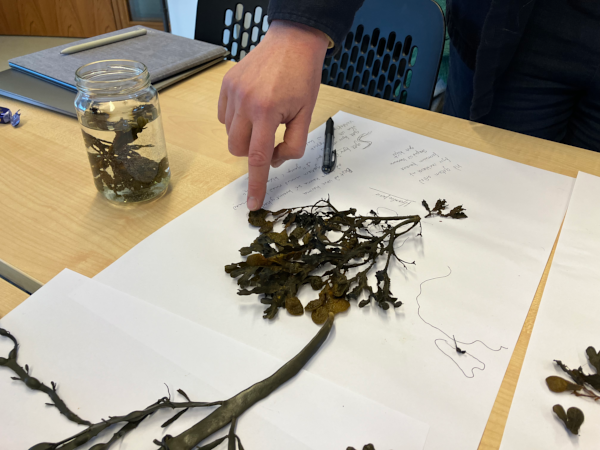
UniArts GINTL project and a practice of micro-ethical interaction presented in Reykjavík
At the invitation by the Iceland University of the Arts (Listaháskóli Islands), the UniArts GINTL project was presented in Reykjavík on September 23, 2024.
As part of the visit, Heli Kauppila and Kenneth Siren held a workshop on university pedagogy in the arts, where embodied habits and teacher’s ethical action were approached in interaction with plants. The approach that had branched out from the University pedagogical studies in the arts at the Uniarts Helsinki, had been shared and developed further with artist-educator colleagues at the University of the Dar es Salaam: Creative Arts during the seminar day on November 6, 2023. Now, the practice had landed upon the algae-covered coastal rocks of Iceland.
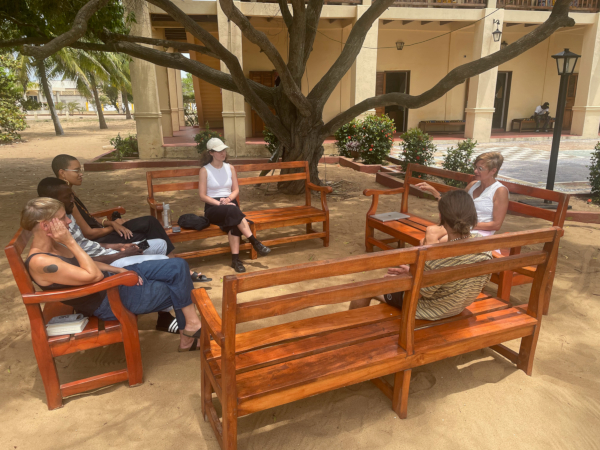
Visit to Villa Karo in Benin
Marika Orenius visited the Finnish Institute for West Africa at Villa Karo in September–October 2024. The cultural centre, located in the village of Grand-Popo in Benin, showcases Finnish arts and culture, and promotes cooperation between Finnish and African artists and researchers. Villa Karo provided an opportunity to learn about the local cultures and enhance the artistic and research activities of the GINTL project.
Chapter on ethical actions with plants in higher education in the arts
In December 2024, the Theatre Academy of the University of the Arts Helsinki will release the anthology 10-Years of University Pedagogy in the Arts: Perspectives on Arts and Artist Pedagogy, edited by Heli Kauppila and Leena Rouhiainen. In one of the chapters, “Eettistä toimintaa kurpitsantaimien kanssa: taidealojen yliopistopedagogiikka määräytymättömien tilanteiden ja aistisen tiedon tyyssijana” [Ethical actions with squash seedlings: University pedagogy as the nesting site for indeterminate situations and sensuous knowledge] Kenneth Siren writes about a practice that began within the university pedagogical studies in the arts at the Uniarts Helsinki. In the practice, teacher’s ethics are approached through micro-ethical interaction with plants. In their article, Siren touches on the seminar day held at the Creative Arts Department of the University of Dar es Salaam. The day, focused on university pedagogy in the arts, was organised as part of the UniArts GINTL project in November 2023.
The article in question is in Finnish. However, an introductory chapter to the book summarises the contents in English.
Project name
Uniarts GINTL (Global Innovation Network for Teaching and Learning)
Time
01/2021-12/2024
Funder
Ministry of Education and Culture in Finland
Team
Heli Kauppila
Doctor of Arts (Dance), University Lecturer, Project Co-Leader UniArts GINTL, heli.kauppila@uniarts.fi, +358 40 7104205
Marika Orenius
Doctor of Arts, Lecturer in Art Pedagogy (Academy of Fine Arts), Project Co-Leader UniArts GINTL, marika.orenius@uniarts.fi, +358 50 4707289
Tarja Pitkänen-Walter
Doctor of Fine Arts, Professor of Painting (Academy of Fine Arts), Expert UniArts GINTL, tarja.pitkanen-walter@uniarts.fi, +358 50 3844318
Kenneth Siren
Doctoral researcher in the arts (Theatre), Lecturer in Pedagogical Studies in the Arts, Expert UniArts GINTL, kenneth.siren@uniarts.fi, +358 50 4315753
Find out more
Video documentation: Seminar day at Nafasi Art Space in November 2023
Video documentation: Seminar day at the University of Dar es Salaam in November 2023
Introduction
UniArts GINTL is a research-based project that develops international educational partnerships through artistic thinking and art practice. In the UniArts GINTL project, artists, teachers, and researchers commence, develop, and maintain responsible joint endeavours. At the heart of the arts-based approach is coming together in dialogue.
Arts pedagogy that builds sustainable futures both requires and constructs knowledge on intercultural collaboration. Arts-based and experiential processes make room for stopping and sharing. This allows for topical and historical phenomena affecting education, such as distribution of power and ethical and ecological challenges, to be examined. The project centres on reciprocal and collective possibilities of knowledge formation.
Seminars

Seminar on university pedagogy in the arts at the University of Dar es Salaam
On 6th November 2023, a seminar day on higher arts education was held at the University of Dar es Salaam. The event was organised together with the Department of Creative Arts of the University of Dar es Salaam, and UniArts GINTL. Despite the shorter and lighter of Tanzania’s rainy seasons serving heavier than expected rainfall, the day brought together a large number of academic staff from the department.
Originally established as a unit for teaching theatre arts, the Department of Creative Arts now offers degrees in music, theatre, film and TV, as well as fine arts and design, ranging from the bachelor’s to the doctoral level. In addition, working artists’ residencies are held at the campus.
During the planning for the seminar day, a shared interest in developing the pedagogical thinking and skills of artist-teachers had emerged. A key question was, how the artist’s own artistic practice and the knowledge generated from those processes were transformed and supportive towards the pedagogical work. The head of the Department of Creative Arts, art teacher and researcher Dr. Daines Sanga, also hoped the seminar would touch upon the numerous opportunities offered by the arts in supporting pedagogies other than the “banking model” of education.
Indeed, there was time to discuss many other possibilities in higher arts education. At the beginning of the seminar day, the practices of the Department of Creative Arts and the expectations towards the upcoming academic year were discussed. From here, we moved on to exploring different pedagogical approaches, ranging from learning café -type discussions to examples of studio discussions and artistic research practices.
UniArts GINTL artists and teachers Dr. Marika Orenius, Prof. Tarja Pitkänen-Walter and Kenneth Siren gave a short presentation about the University of the Arts Helsinki and what its university pedagogical studies in the arts have to offer. From there, as a counterbalance to all the sitting, we moved on to experimenting with an artistic research practice used by Siren in their thesis work, in which repeating still body positions lead to associating freely. This, like the other suggestions or invitations to art pedagogy presented at the seminar, aimed at taking into account the existing knowledge being brought in by the participants.
As the afternoon rain was pelting down, Prof. Pitkänen-Walter and Dr. Orenius gave a demonstration on studio discussions, a widely used method at the Academy of Fine Arts of the University of the Arts Helsinki. Studio discussion describes a situation where the learner and the teacher meet in the presence of a work of art that is being made. In this situation, the aim is to create a reciprocal, shared space of in-between, in which the unfinished work steers the discussion and enables the grasping of the knowledge that is not yet known. Dr. Dinnah Enock, a researcher and sculptor at the University of Dar es Salaam, stepped into the role of an artist presenting her work. The audience participated in the discussion in the presence of the works, and afterwards the studio discussion was reflected on as a teaching method.
For the last session of the day, some tables were set up similarly to a learning café. This demonstration showcased how the university pedagogical studies in the arts the at the Uniarts Helsinki combine theoretical discourses, artistic practices, and open discussion. Ethical questions related to teaching in the arts were approached in different ways: For example, the participants drew self-portraits with their eyes closed, based on their sense of touch, and then used their experiences to locate values. Notes about a theory of situational ethics were written for the following participants to discover. Whereas, in the university pedagogical studies in the arts in Helsinki, the arts teacher’s microethical activities had been approached with butternut squash seedling, now local plant parts and fruits took part in the practice.
What became strongly highlighted, was the importance of the teacher’s own artistic work as part of the pedagogical practice at the university. It was agreed that the arts tackle themes and societal phenomena on a sensory and emotional level. Starting from practical activities and continuing in a more abstract direction was regarded as sensible. Whereas the banking model of education assumes that the teacher brings with them the already known facts, art pedagogy can follow a different kind of logic: the artistic process can begin without clear knowledge about the outcome, and so teaching can also find its shape during the learning process together with the learners.
Documentarist Aika Kirei filmed footage at the event as material that can be returned to later. Here’s a YouTube link to video documentation on the seminar day.

Seminar day on artistic thinking and practice
In November 2023, the UniArts GINTL team visited Nafasi Art Space, in Dar es Salaam, for the second time. The seminar day delved into the connections between knowledge formation and artistic thinking and practice. The event was visited by both already-established collaborators as well as new acquaintances.
The event, held on 3rd November, was organized together with Alama Art and Media Production. At the suggestion of Alama’s artistic director Paul Ndunguru, two large-scale paintings were created at the event, which were then joined together into a single work.
The artist-teachers from the UniArts GINTL team, Marika Orenius, Tarja Pitkänen-Walter, and Kenneth Siren devised discussion groups around the collaborative painting. The groups engaged with questions revolving around art and pedagogy in the arts. How do artistic thinking and practice help us understand different phenomena? What role does arts pedagogy play in this?
The temporal perspective of learning in the arts was approached with questions such as: Which artworks and people have influenced you on your journey to work in the arts? How do viewers and different environments interact with your works? What kind of arts pedagogy does the future need, and what kind of futures could the arts create?
Among other insights, the responses found links between ideas, feelings, and creativity. Artistic ideas sometimes require an external stimulus, and sometimes some peaceful alone time. Becoming an artist could come through rising up to challenges or from being granted individual freedom. Some participants also saw artistry as something inherited in the blood and from the family heritage. Overall, many hoped that taking part in the arts could become more accessible across diverse communities and different educational backgrounds. Online environments and smart technology were recognised to enable practicing the arts even in remote areas and over long geographical distances.
The participants of the day represented a wide range of artistic disciplines. Among the many, creating writing, dance, film, fine arts, music, and theatre were represented. From their discussions, the participants chose topics to bring to the painting. These topics were then expressed in the painting through both representational and abstract forms. At Orenius’s suggestion, a camera harness was devised to be worn on the participant’s chest. This allowed the artists to film their painting process in a self-directed, close-up manner. A small crew led by documentarist Aika Kirei filmed material at the event for later use. Here’s a YouTube link to video documentation on the workshop.
The seminar day ended with a performance by The Zawose Family, a music and dance group from Bagamoyo. The group follows in the footsteps of late musician Hukwe Zawose. Highly regarded for his singing, and expertise with ilimba and zeze, Dr. Zawose was awarded an honorary doctorate from the Sibelius Academy in 1997.
Coincidentally during the seminar day, Nafasi also hosted a large event for schoolchildren. Towards the end of the day, a group of children joined to follow the dance performance and finished the collaborative painting.
“Sanaa ni udongo na chipukizi” — “Art is both the earth and the sprout”

Conventions of higher education in the arts, and the informally trained arts teacher
During the visit organised by the UniArts GINTL project, a seminar day was held on the historic maritime fortress island of Suomenlinna just off the Helsinki coast. In the seminar, the guests representing four Tanzanian arts institutions, and the Finnish teacher-researchers of the project discussed both arts pedagogy at the higher education level and the status of the so-called self-taught teacher in the arts. What happens when the self-taught artist becomes a teacher? What kind of pedagogy will they construct out of their own relationship with the arts and their past experiences?
Many of the guests expressed interest in curriculum development in higher education pedagogy in the arts. In Suomenlinna, teachers from Uniarts Helsinki’s University Pedagogical Studies in the Arts held a presentation on the structure of the studies, and the contents of and values underlining the curriculum. Experiences and findings from the Non-Degree Pedagogical Studies in the Arts were touched upon as well. In the studies, broad topics such as acting ethically, advancing sustainability, acknowledging diversity, and examining questions of power, are brought together with the actual teaching practices in the arts.
During the day, 19th of April 2023, the participants split into smaller groups to reflect on the status and the diverse skillsets of the so-called self-taught teacher. From the outset, it was decided that, at least in the Tanzanian context, the term “self-taught” came across inaccurately. In fact, the artist would have drawn their craft from somewhere, from their past experiences, as part of a community or communities. Therefore, the term “informally trained” was preferred.
The status of the informally trained artist must be strengthened in the higher education system. During the talks, certain ideas about the informally trained artist-turned-teacher were put forward: Perhaps the artist has been drawing from their experiences with and observations of their community’s customs and traditions; hence, they can support the continuation of local or indigenous artistic expressions. The artist-teacher who has had an informal training might not be inclined to follow rigid procedural systems for measuring learning and growth but be willing to take into account the actual pedagogical situations as well as apply their skills in varying informal environments.
The challenge identified in both Finland and Tanzania was the recognition of informal learning in higher education systems. However, formal education in pedagogy in the arts was considered potentially useful for the informally trained artist. Since they may have based their artistry and teaching on a very particular and personal point of view, formal education may provide diverse, alternative ways to teach. Formal training should offer the time and the means for the artist-teacher to reflect how they themselves were taught and how they learned succesfully, and whether alternative ways could be found to complement these.

Seminar day at Nafasi Art Space
On October 24, 2022, UniArts GINTL organized a seminar in collaboration with Nafasi Art Space. At the event, artists and arts educators came together to discuss ongoing and relevant questions, such as the expectations of the art field and the aspirations of artists for the future. How could the role of art and art pedagogy bestrengthened in society? What kinds of learning and teaching methods could multidisciplinary and international collaboration co-create?
Nafasi Art Space is an arts organization founded in 2008 in Dar es Salaam. Nafasi provides gallery, performance, and workspace facilities. As a cultural institution, it aims to nurture creativity and professionalism within the Tanzanian art scene while organizing accessible art events for all audiences. In addition to short-term training and collegial activities, the quite recently established Nafasi Academy offers long-term arts education and mentoring to young artists from various disciplines.
Approximately 50 local artists, artist-educators, and representatives from art institutions participated in the seminar. Jaana Erkkilä-Hill, Vice Rector responsible for research at the University of the Arts Helsinki sent hergreetings to the event via video call. As the evening progressed into round-table discussions in the style of the learning café, the attendees pondered on the knowledge generated by art, and on the questions related to art pedagogy.

Seminar on decolonised knowledges, and the beauty of ngoma
In May 2022, UniArts GINTL organised the seminar Co-Creating Decolonized Knowledges Through Arts at the Theatre Academy of the Uniarts Helsinki. The list of presenters, facilitators, and panelists at the event included, among others, the head of university pedagogical studies in the arts Heli Kauppila, lecturer in art pedagogy Marika Orenius, lecturer and researcher in music education Katja Thomson, docent in sociology with specific expertise in studies in diversity Alemanji Aminkeng Atabong (UniArts GINTL 2022), multi-instrumentalist and educator Kauzeni Lyamba, musician and visiting teacher at the Sibelius Academy Kasheshi Makena, and choreographer and dance teacher Heidi Seppälä. The afternoon was set off artfully by the band Venhe.
Decolonial practices and decolonising knowledge were approached through lectures, participatory sessions, and sharing. Many in the audience seemed drawn to the concept “ngoma”. Standing for a dance, a drumming instrument, a celebration as well as any and all art forms present at the same time, ngoma was considered an inviting tool to resist the splitting of the arts into specific, separate disciplines which has taken root in the Western arts education.
Check the site for the seminar.
Visits

Building international partnerships
In October 2022, representatives from the Uniarts Helsinki visited Dar es Salaam, Tanzania. University lecturer Heli Kauppila, lecturer Marika Orenius, and other active members of the project met with artists and educators from the University of Dar es Salaam Creative Arts, Bagamoyo College of Arts, the Action Music Academy Tanzania, Alama Art and Media Production, and Nafasi Art Space, amongst others.
Reciprocal visit to Uniarts Helsinki by Tanzanian partners
Between the 17th and 21st of April 2023, the University of the Arts Helsinki had the pleasure of hosting a group of artists, researchers, and teachers in the arts from Bagamoyo and Dar es Salaam, Tanzania. The artist-teachers represented several institutions in arts education, such as University of Dar es Salaam, Creative Arts; TaSUBa (Bagamoyo Institute of Arts); Action Music Academy Tanzania; Alama Art and Media Production, and Nafasi Art Space. The trip included visits to the different academies that make up Uniarts Helsinki, and presentations about the work of the Tanzanian institutions. Local Finnish cultural sites and organisations were visited as well.
The guests represented different disciplines of the arts, and many combined practices of the different fields in their work. Therefore, getting to know the different academies of Uniarts Helsinki felt very appropriate. The Sibelius Academy welcomed the guests with open practice sessions by the Music Education, and the Global Music programmes. One of the visiting artists, Kauzeni Lyamba, a multi-instrumentalist and performer, held an open workshop at the Musiikkitalo concert building.
At the Academy of Fine Arts, we took a look at the setting up of Kuvan Kevät. The annual MFA degree exhibition showcases works by students who are finishing their studies. Additionally, we got to briefly observe the work that goes into research on pigments. The Theare Academy enabled meeting academic and administrative staff and trying out some specific performative practices in artistic research. During the week, many different topics were touched upon in conversation, from opportunities for international students to the sculpting materials local to both countries respectively.
Even though the April weather was not necessarily sunny or warm, Uniarts and Helsinki were described as friendly and welcoming. The eight-day trip was organised as part of the UniArts GINTL project to build partnerships in the arts education. The collaboration will continue in the form of return visits and remote meetings.
Visits to the Department of Creative Arts, University of Dar es Salaam
Two autumns in a row, the team from the UniArts GINTL project has visited the Department of Creative Arts of the University of Dar es Salaam. In 2022, the team was introduced to the teaching activities and facilities of the university as well as its exhibition spaces. The visit laid the groundwork for future cooperation. During the November 2023 visit, an arts-based university pedagogical seminar day was created collaboratively. The UniArts GINTL team also got to know the residence artist programme of the UDSM Creative Arts, which at the time focused of sustainability and found materials. As the collaboration was deepened, knowledge on different possibilities and practices for teaching in the arts was exchanged.
Daines Sanga’s guest talk at the university pedagogical studies in the arts
At the 15th November 2023 meeting of the university pedagogical studies in the arts, of the University of the Arts Helsinki, Dr. Daines Sanga gave a guest lecture remotely. Dr. Sanga is the Head of the Department of Creative Arts of the University of Dar es Salaam. During the session, Dr. Sanga talked about the diversity of working methods and the diversity of students and staff at the Department of Creative Arts. The department offers studies in visual arts, design, theatre, film and music.
Dr. Sanga, who has written about community arts, youth cultures, and gender in the arts, talked about her own journey as a student, teacher, and artist researcher. Among other topics, she offered insights into how gender, geographical area, and birth order may affect opportunities to study.
The teachers of the study unit “Diversity in arts education”, Dr. Anu Koskinen and Kenneth Siren, facilitated the session. The discussion brought up interesting similarities and distinctions between the two institutions. For example, the admissions to the Department of Creative Arts of the University of Dar es Salaam are largely determined through a national system whereas entrance examinations have been central at the University of the Arts Helsinki. Sanga, who defended her doctoral dissertation at the University of Bayreuth, also highlighted the differences between German and Tanzanian educational cultures.
The collaboration between the Department of Creative Arts of the University of Dar es Salaam and the University of the Arts Helsinki was made possible through the educational partnership initiated during the UniArts GINTL project.
Visiting the Cultural Arts Centre Zanzibar
At the end of October and beginning of November 2023, the UniArts GINTL team visited Tanzania to continue the discussion on art pedagogy and international collaboration. During the trip, the team deepened contacts with previously found partners and met with new potential collaborators.
One of the new connections made was with the Cultural Arts Centre Zanzibar, which the team visited on 30th October. Founded in 2006 by painter Hamad Hamad, the cultural centre is located in the Stone Town of Zanzibar. In addition to providing working space for artists, the centre offers a wide range of courses from painting and screen printing to soap making and bookbinding. In particular, the centre organises arts classes and workshops for local women and students.
Other branches of the project

Developing an arts-based library at Nafasi
Nafasi Art Space has been developing a reading library for artists in Dar es Salaam. In the spring of 2024, UniArts GINTL project sent ten books to their collection, selected from Uniarts Helsinki’s publications on fine arts, curating, performing arts, and arts pedagogy.
The Nafasi Academy of the Nafasi Art Space offers two-year learning programmes for artists and curators. The establishment and development of an arts reference library is part of Nafasi’s strategy for artist development.
Advancing antiracism and decolonising university in higher education pedagogy in the arts
The UniArts GINTL project and the University Pedagogical Studies in the Arts collaborated on the development of a new study unit which was held in the autumn 2022. The objective was to introduce decoloniality as a theme to the university researchers and teachers, with connected theoretical underpinnings and examples from the practice .
Arts pedagogy making space for idleness and stopping
Collaboration striving towards equality needs to be grounded in an ongoing dialogue. Therefore, it was decided that the project would not be founded on advancing any particular predetermined educational content. Rather, the project would make space for stopping and observing those phenomena, topical or arising from tradition, which affect education and art making.
At the ELIA Biennial Conference, held at the Theatre Academy of Uniarts Helsinki in November 2022, Heli Kauppila, Marika Orenius, and Katja Thomson held a participatory session where topical questions and the spaces for teaching were approached through idleness and arts-based reflection. The journey took the participants from underneath the skylights of the Mylly building to the warmly and dimly lit studios of Kookos where written instructions facilitated stopping, slow pondering, and soft movement.
Read more about the ELIA 2022: No Stone Unturned conference. An “aftermovie” of the conference can be found through the link.
Developing education with artistic thinking and arts-pedagogical competence
The study module pilot made possible by the UniArts GINTL project was presented at the Pedaforum: Higher Education Pedagogy seminar held at Tampere on June 7, 2023. Heli Kauppila introduced the multifaceted connections between teaching and research in a conference presentation which was based on her own experiences as the head of the UniArts GINTL project and university pedagogy in the arts program. In her presentation, Heli reflected on a sustainable and diverse university community from the perspectives of a sense of belonging, sufficiency, and supportive orientation.
During the conference, a topic that aroused interest was linking developing pedagogy with artistic thinking and arts-pedagogical competence. Higher education pedagogical studies were seen as an opportunity to foster reciprocity and collaboration between students, teachers, and researchers.
Exchanging experiences with the University of Lapland and the Uniarts Helsinki
The “Arts, Culture and Well-being” group of the University of Lapland’s Safinet network invited Heli Kauppila and Marika Orenius to their online meeting on May 24, 2023. During the remote visit, participants shared experiences from various educational partnerships and the processes of building cooperation between Finnish, Namibian, and Tanzanian universities, teachers, and researchers. Heli and Marika talked about the phases of the UniArts GINTL project and their observations regarding project management, teamwork, and work community skills. The themes that came up in discussion included the importance of reflecting on one’s own positionality and listening to one another with an open approach.
Higher education pedagogical pilot presented
Outcomes of the UniArts GINTL research project were presented at the academic coffee chat organised by the The Global Innovation Network for Teaching and Learning (GINTL) on 7th March 2023.
Heli Kauppila and Marika Orenius, both research leaders in the project, introduced the pilot which had been conducted in the autumn of 2022. During the pilot, a new study unit was developed for higher education pedagogy in the arts based on the themes of the research project, such as international partnerships and decolonization. The study unit allowed for collaboration between teachers and researchers from different academies and degree programmes. Additionally, degree students worked as experts during the project.
At the coffee talk, the pilot elicited a lot of discussion and interest from the other GINTL actors (GINTL Africa, GINTL China, and GINTL India). Integrating ongoing research into teaching was found noteworthy. The study unit also emphasised the role of university pedagogical studies in bringing together people within the university.
Link to the coffee chat archive of the GINTL network.

UniArts GINTL project and a practice of micro-ethical interaction presented in Reykjavík
At the invitation by the Iceland University of the Arts (Listaháskóli Islands), the UniArts GINTL project was presented in Reykjavík on September 23, 2024.
As part of the visit, Heli Kauppila and Kenneth Siren held a workshop on university pedagogy in the arts, where embodied habits and teacher’s ethical action were approached in interaction with plants. The approach that had branched out from the University pedagogical studies in the arts at the Uniarts Helsinki, had been shared and developed further with artist-educator colleagues at the University of the Dar es Salaam: Creative Arts during the seminar day on November 6, 2023. Now, the practice had landed upon the algae-covered coastal rocks of Iceland.

Visit to Villa Karo in Benin
Marika Orenius visited the Finnish Institute for West Africa at Villa Karo in September–October 2024. The cultural centre, located in the village of Grand-Popo in Benin, showcases Finnish arts and culture, and promotes cooperation between Finnish and African artists and researchers. Villa Karo provided an opportunity to learn about the local cultures and enhance the artistic and research activities of the GINTL project.
Chapter on ethical actions with plants in higher education in the arts
In December 2024, the Theatre Academy of the University of the Arts Helsinki will release the anthology 10-Years of University Pedagogy in the Arts: Perspectives on Arts and Artist Pedagogy, edited by Heli Kauppila and Leena Rouhiainen. In one of the chapters, “Eettistä toimintaa kurpitsantaimien kanssa: taidealojen yliopistopedagogiikka määräytymättömien tilanteiden ja aistisen tiedon tyyssijana” [Ethical actions with squash seedlings: University pedagogy as the nesting site for indeterminate situations and sensuous knowledge] Kenneth Siren writes about a practice that began within the university pedagogical studies in the arts at the Uniarts Helsinki. In the practice, teacher’s ethics are approached through micro-ethical interaction with plants. In their article, Siren touches on the seminar day held at the Creative Arts Department of the University of Dar es Salaam. The day, focused on university pedagogy in the arts, was organised as part of the UniArts GINTL project in November 2023.
The article in question is in Finnish. However, an introductory chapter to the book summarises the contents in English.